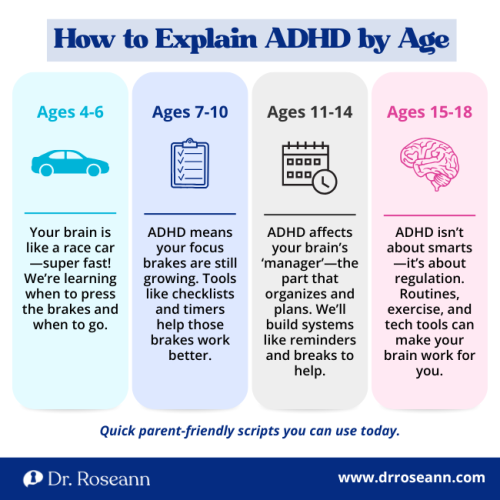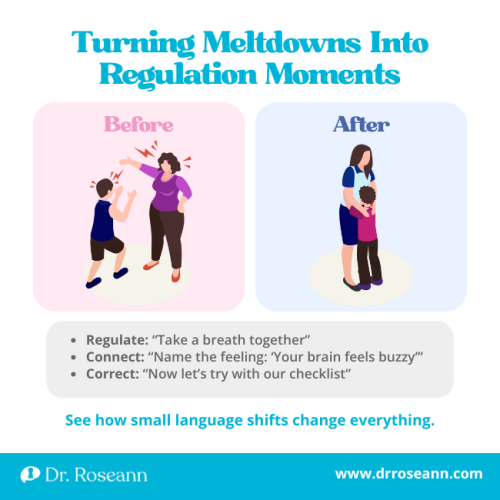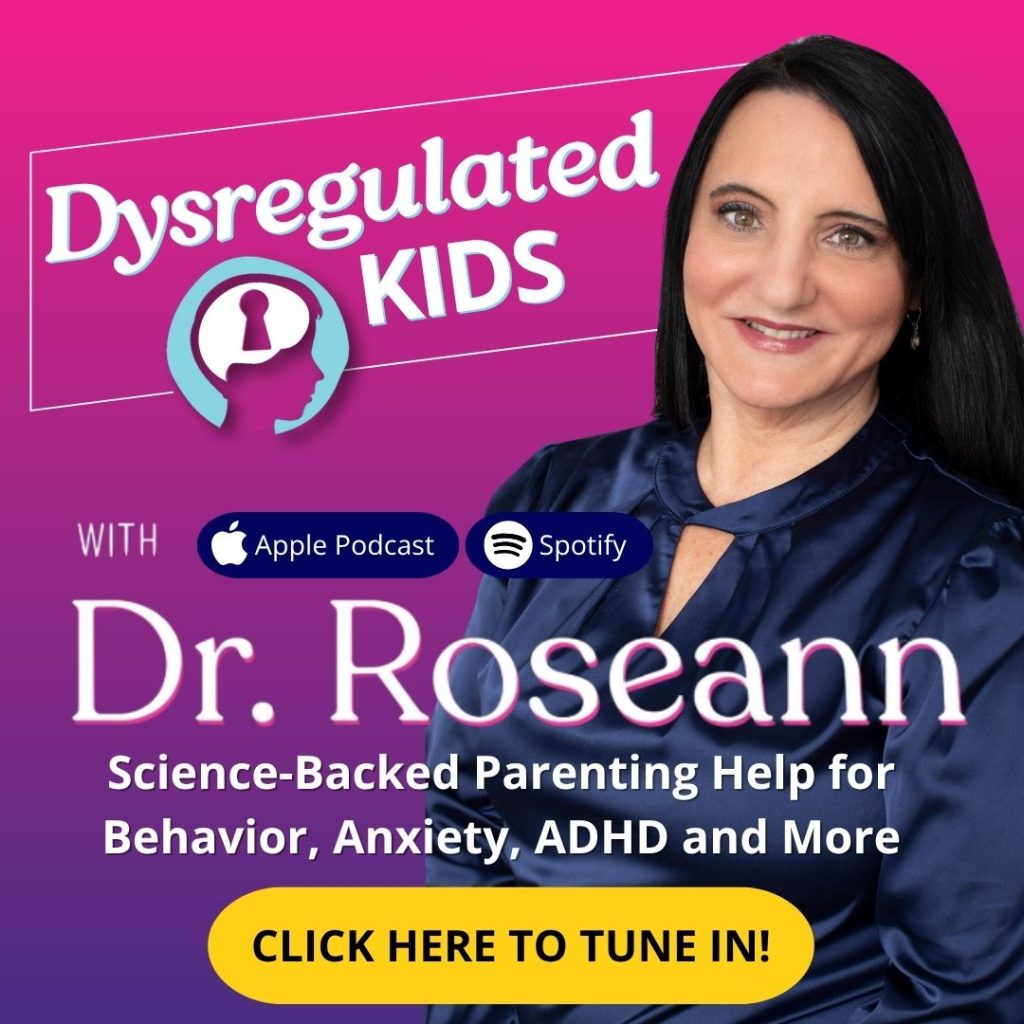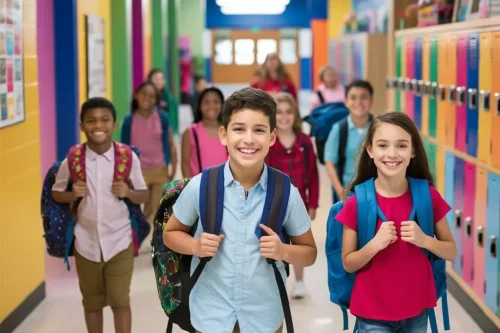Estimated reading time: 7 minutes
When kids say, “I hate my brain,” they aren’t being dramatic—they’re asking for understanding.
How you explain ADHD can shape their self-worth for years to come.
This guide gives you simple, strengths-based language and my Regulation First Parenting™ tools to help your child see their brain with pride, not shame.
Simplest Ways to Explain ADHD To Your Child Or Teen
Keep it short, hopeful, and tangible. Try this:
Core script:
“Your brain is amazing at noticing many things. That can make focusing on one thing harder sometimes. ADHD means your brain needs extra tools to focus and slow down impulses. We’ll practice those tools together, because there’s nothing wrong with you—you have a different kind of brain, and we’re learning how to use it.”
Why This Works
- Strengths-first framing protects self-esteem and reduces shame.
- Plain language beats medical jargon.
- Action focus (“we’ll practice tools”) builds agency and hope.
Research note:
Parent psychoeducation improves ADHD symptoms and prosocial behavior versus support alone (Ferrin et al., 2014). That means the way you explain and coach truly matters.
How To Tailor The Conversation By Age
Use simple analogies when you explain ADHD to a child, then add detail as they grow.
Ages 4–6
“Your brain is like a race car—super fast! We’re learning when to press the brakes and when to go.”
Ages 7–10
“ADHD means your focus brakes are still growing. Tools like checklists, movement breaks, and timers help those brakes work better.”
Ages 11–14
“ADHD affects executive functions—the brain’s manager for planning, time, and impulse control. We’ll build systems (planners, phone reminders, body breaks) so your manager gets the help it needs.”
Ages 15–18
“ADHD isn’t a lack of intelligence; it’s a regulation difference. Let’s match goals (grades, sports, work) with supports—structured routines, exercise, sleep, and tech tools—to make your brain work for you.”

Parent example:
Inna, mom of a 6-year-old, tried the race-car analogy at bedtime. Her son started asking, “Can you help me put on my brakes?” That one phrase transformed power struggles into teamwork.
Takeaway: Pick an analogy your child loves and keep repeating it.
How To Focus on Strengths So Your Child Doesn’t Feel “Broken”
Strength audit (do this out loud):
- “You’re curious and creative.”
- “You notice details other kids miss.”
- “You have energy and big ideas.”
Then bridge to tools:
Those strengths need matching tools. These can be movement breaks, visual checklists, and co-regulation. So they shine at home and school.
As E. S. Sonuga-Barke, PhD, and colleagues note, some non-pharmacological strategies (e.g., omega-3s; food dye exclusions in sensitive kids) show small but meaningful effects for some families. Best when combined with behavioral supports. Keep expectations grounded and individualized (2013).
Parent example:
Marcos, 10, loved building Lego cities but couldn’t start homework. His dad reframed him as a “designer” and added a 5-minute “design break” before homework, plus a timer. Homework resistance dropped.
Takeaway: Lead with strengths, then add a tiny routine change.
Which Words Help – And Which Ones Hurt?
Use
- “Different brain,” “regulation,” “tools,” “growing skills”
- “Let’s calm the brain first and then try again.”
Avoid
- “Bad,” “lazy,” “you never,” “why can’t you just…”
- Over-explaining the diagnosis at stressful moments
Quick science check: Magnesium levels can be lower in some children with ADHD (association, not proof of cure); always discuss supplements with your provider (Effatpanah et al., 2019).
Parent example:
Priya replaced “Pay attention!” with “Let’s get your brain ready—water sip, wall push-ups, pick one task.” Her 8-year-old started initiating the routine.
Takeaway: Swap criticism for regulation cues.
How to Use Everyday Struggles to Build Regulation Skills
Regulate → Connect → Correct™:
- Regulate: Breathe together; offer water and a movement or sensory break.
- Connect: Name the state: “Your brain feels buzzy/slow—me too sometimes.”
- Correct: Teach the skill after a calm moment. Break the task down, set a timer, and use a checklist.
Brain-Friendly Tools
|
Strategy |
Description / Example |
|
Movement & Exercise |
Regular physical activity improves attention and executive skills in kids with ADHD (meta-analytic evidence). |
|
Sleep + Routine |
Consistent wind-down, low-light, and devices-off times to support regulation and rest. |
|
Visual Systems |
Use morning/evening checklists and color-coded folders for structure and predictability. |
|
Co-Regulation Phrases |
“Let’s reset together,” “Try my pace,” “I’ll start, you join.” |
The American Academy of Pediatrics highlights behavioral strategies and parent training as essential components of care—especially for younger children (2019).

How to Support Your Child Who Says “I Hate My ADHD”
- Validate: “I hear you. It’s hard when your brain won’t do what you want.”
- Normalize: “Many kids feel this way; you’re not alone.”
- Re-author the story: “ADHD means we use different strategies. Let’s test two this week and keep what helps.”
Script for school anxiety:
“ADHD makes transitions tough. Let’s practice a morning reset (water + 10 jumps + backpack check). I’ll tell your teacher what helps so we’re a team.”
How To Get Teachers and Grandparents On the Same Page
Share a simple one-sheet:
- Your child’s strengths and triggers
- Top 3 supports (movement breaks, visual checklist, calm cue words)
- What to say during dysregulation: “Let’s take a reset lap.”
Parent win:
When Nora shared the one-sheet with her child’s teacher and grandma, meltdowns at pickup fell by half in two weeks.
Takeaway:
Consistent language across adults reduces mixed signals.
From Understanding to Action: Your Child’s Next Chapter
Explaining ADHD to your child isn’t about getting every word right—it’s about showing them they’re safe, loved, and not broken. With each small conversation, you’re planting seeds of confidence and giving them the tools to grow into their strengths.
Remember:
- Short, strengths-first language builds self-esteem.
- Calm cues instead of criticism reset the brain.
- Consistency across home and school makes your child feel secure.
The big takeaway:
Transformation doesn’t come from one big change—it comes from small, regulation steps, repeated every day, that shift family life toward peace and connection.
Take the next step:
- Try our ADHD Quiz to personalize a plan for your child.
- Explore the BrainBehaviorReset® Program, a natural, brain-first system that combines lifestyle, daily routines, and regulation tools.
Because when you calm the brain first… everything else follows.
FAQs
What if my child doesn’t want to talk about it?
Keep it light and brief. Offer language during calm moments and circle back. Curiosity beats lectures.
Should I say “ADHD” to younger kids?
Yes—use the word, but keep it simple: “ADHD is a brain difference. It means your focus brakes are still growing.”
How often should we revisit the conversation?
Regularly. Brains change with age. Re-script at new school years, activities, or life transitions.
Do I tell classmates?
Follow your child’s lead. Role-play a short “kid-friendly bio” (e.g., “I use checklists and breaks to help my brain focus.”).
Terminology
- Executive functions: The brain’s “manager” for planning, time, and impulse control.
- Co-regulation: Your calm helps your child’s nervous system settle.
- Dysregulation: When the brain is in fight/flight/freeze and can’t access skills; behavior is communication.
- Regulate → Connect → Correct™: Calm first, build safety, then teach.
Citations
Ferrin, M., Moreno-Granados, J. M., Salcedo-Marín, M. D., Ruiz-Veguilla, M., Pérez-Ayala, V., & Taylor, E. (2014). Evaluation of a psychoeducation programme for parents of children and adolescents with ADHD: Immediate and long-term effects using a blind randomized controlled trial. European Child & Adolescent Psychiatry, 23(8), 637–647. https://doi.org/10.1007/s00787-013-0494-7
Sonuga-Barke, E. J. S., Brandeis, D., Cortese, S., Daley, D., Ferrin, M., Holtmann, M., … Sergeant, J. (2013). Nonpharmacological interventions for ADHD: Systematic review and meta-analyses of randomized controlled trials of dietary and psychological treatments. American Journal of Psychiatry, 170(3), 275–289. https://doi.org/10.1176/appi.ajp.2012.12070991
Effatpanah, M., Rezaei, M., Effatpanah, H., Effatpanah, Z., Varkaneh, H. K., Mousavi, S. M., … Hashemi, R. (2019). Magnesium status and attention deficit hyperactivity disorder (ADHD): A meta-analysis. Psychiatry Research, 274, 228–234. https://doi.org/10.1016/j.psychres.2019.02.043
Always remember… “Calm Brain, Happy Family™”
Disclaimer: This article is not intended to give health advice, and it is recommended to consult with a physician before beginning any new wellness regimen. The effectiveness of diagnosis and treatment varies by patient and condition. Dr. Roseann Capanna-Hodge, LLC, does not guarantee specific results.
Are you looking for SOLUTIONS for your struggling child or teen?
Dr. Roseann and her team are all about science-backed solutions, so you are in the right place!
©Roseann Capanna-Hodge










